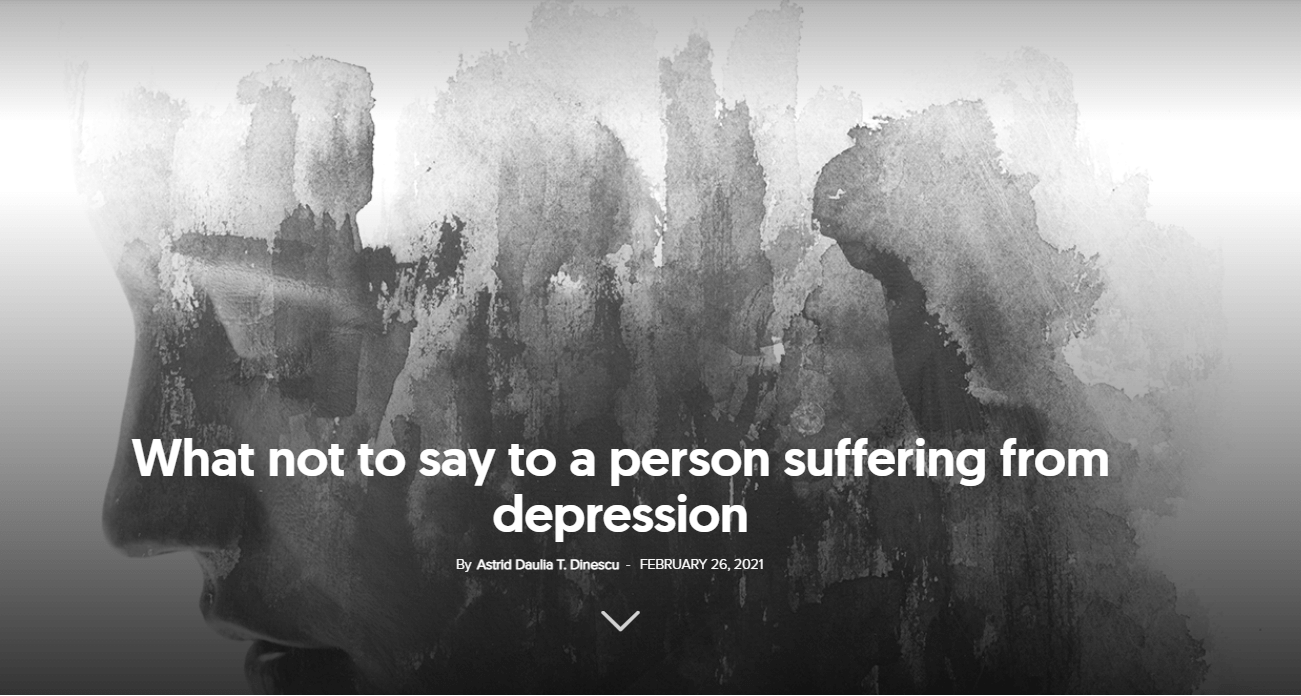I talked to Pastor Nicu Butoi about the role that religion could play in treating depression and hopelessness, at the end of a series of evangelistic presentations he gave to a full-house before the pandemic.
Although he left his home country for the United States more than 20 years ago, Nicu Butoi still holds a special place in the hearts of many Romanian Evangelicals. The warmth of his sermons and the way he manages to convey hope to the audience are signatures of his preaching. This is why Nicu Butoi is fortunate to have crossed denominational boundaries and has often been invited to preach in churches other than the one to which he belongs—the Seventh-day Adventist Church.
AK: You often say that discouragement is one of the most acute problems in our society. How do you explain this, given that society is constantly evolving? Isn’t discouragement just a problem for the maladapted?
NB: It doesn’t depend on adaptation, as it doesn’t depend on material status either, nor on social position; one will find discouraged people living at any societal level and in any material condition. I think this is strongly related to the loneliness in which modern man moves—more and more lonely, more and more isolated. Alienated, especially from God. People have rejected God after feeling their prayers have not been answered.
And God has withdrawn, as He has always done, and now, in this loneliness, people are living a traumatic experience; only now do we realize what this loneliness means. Some find their way back to God, but many no longer find this way and try to compensate with something else, to substitute the need for God with something else. It is one failure after another. Never under the heavens and under the sun could anyone say that they’ve quenched their soul’s thirst with one thing or another.
Trying to replace God goes against human nature. And this is where these feelings of abandonment, discouragement, and uselessness come from—it is a complex combination of factors that we see beginning to manifest.
AK: You also say that God is ready to save the discouraged. What are the conditions?
NB: No conditions. God loves unconditionally. It’s as if someone comes to your house and brings you life-saving medicine, and the only condition is to take it, nothing else. God asked for nothing but availability. He said, “Son, give me your heart, and I will make it healthy.” That’s all. When the father received and robed the prodigal son, he did not put any conditions on him, he restored him in a moment, absolutely.
The only obstacle to this is this inertia keeping us in the same state, in which it is difficult for us to acknowledge our moral bankruptcy and failure. And that stops us. We stumble in our own being, in our own pride, even when we pray to God. It’s that image of the man praying and praying to God… How absurd! That man would better pray to himself! God does not expect us to beg Him for anything.
The Saviour declares, “I do not tell you that I will pray to the Father, because the Father Himself loves you,” so there is no need for Him to be implored in this way. If we want to identify a cause somewhere, we find it very easily within ourselves.
AK: Does God save even those who do not have the courage to believe in Him?
NB: Without a doubt! The Bible categorically says, “He causes his sun to rise on the evil and the good.” God views us all as His family. And He is an impartial God, a God who desires, waits, and thirsts for our answer. No, I don’t think God would stumble upon anything in our lives or the lives of anyone who would like to receive the gift of life and righteousness. He would not be hindered by anything other than that person’s choice to refuse His gift.
AK: If the impediment is in themselves, how can people who prevent God from acting become aware that they are their own worst enemies?
NB: This can only be realized in the presence of God. It is a matter of accepting reality, of recognizing it. There is no man who, in the depths of his conscience, does not know that his little faith or unbelief is what prevents God from changing him.
AK: Can discouragement be overcome without God? That’s what psychologists say.
NB: Psychologists do say that, but it is a vicious circle. Life has shown that by applying such solutions—medication or psychotherapy—the condition returns in a much more serious form. Trying to do something in life without God leaves such a void in the soul… even if the problem seems to be solved, it is not solved fundamentally, only superficially.
AK: Does God have favourite ways to intervene in people’s lives?
NB: Yes, and it’s a custom intervention! Because every man is unique. God, who knows the language of every soul, addresses that soul in its own language, with these means, in these ways. Moreover, he does so even through the misery of a man, as the Bible says, ”those who suffer he delivers in their suffering.” Even from the misery of a man, God can make a way out for him.
AK: Are there times when God intentionally refuses to take us out of discouragement?
NB: Oh, I couldn’t say that. I am a sinful man, and I could never be impassive if I knew I could get my child out of a negative situation. I could never resist it. The Bible says, “If you, then, though you are evil, know how to give good gifts to your children, how much more will your Father in heaven give good gifts to those who ask him!” I had the opportunity to experience a time when I had a choice in this area, and I must confess that I would gladly give my life to save my children’s.
And if I am able to think that way, how can we believe that God thinks differently? How can we believe that God is less good than a man who loves his children? Therefore, no. There is no such discrimination. There is no predestination in God. The Bible also says, “God so loved the world.” And chapter 1 of the Gospel of John says He “gives light to everyone who was coming into the world.” Whether they know God or not, whether they are, in any part, of the world, this light illuminates every person coming into the world.
AK: Many Christians say that this life is a difficult one and that we can only have gloomy expectations of the future. If we look around, we find a lot of reasons to believe that. In addition, Jesus warned the disciples that “In this world you will have trouble.” What should we expect from the future?
NB: I do not think that the question “What should we expect?” is legitimate. It doesn’t matter what we expect, it matters who we wait for. If we see the future through the lens of the presence of God in our lives, the future will not be bleak. Or even if it is gloomy, it will be bright inside our souls. So, the question is not “What will the future be like?” but “Who will we face this future with?”
It doesn’t matter what this future holds for us, it matters who we meet. Because from this earth we derive the depressing moods of our generation, we can also derive the positive moods of life from God, which are based not on trust in psychological techniques, but on faith in God and the real and factual reception of God’s agency in our lives.
AK: You frequently preach about a God who “saves and restores.” How can this be an encouragement if we know, at the same time, that we do not have a bright future ahead of us?
NB: The very fact that God is the guarantor of this promise—and I think no one has the strength to doubt God, to believe that He says one thing and does another—then the name of God and the history of God and the experience of humanity are more than solid guarantees for this certainty. God’s promises in the book of Isaiah have been repeated in many gloomy circumstances: “Though the mountains be shaken and the hills be removed, yet my unfailing love for you will not be shaken nor my covenant of peace be removed”.
This is what God says, not man. And there is no realm of life that falls outside the scope of this promise. There are no situations where you do something, and God withdraws his love from you. None whatsoever.
AK: How do you see discouragement? Is it shameful to be discouraged?
NB: It is a sin in itself. Except in the case where a man does not know this, and does not know God and cannot be judged as one who knows God. But this phenomenon marked the lives of the saints, who went through depressive phenomena. And these are the great names of the Scriptures! It is human to fall—but you must get up again. It is not a way of life. It is not a state that settles within us as Christians. It is a situation that sends us back to God or makes us aware, at least, of God’s presence.
AK: How can we help our discouraged friends, especially those who isolate themselves when they are discouraged?
NB: This “operation” is very delicate. Personally, I share with them, very subtly, what God has done in my life. And I give them the opportunity to draw the conclusion. And I pray that God will do for those people what He has done for me. I have seen many answers to this prayer.
AK: What exactly do you mean when you say “subtle”?
NB: I mean that a person may be “allergic” and may not have the patience to hear a word about God. Maybe they’re afraid you’re going to talk to them about God. But I have had the opportunity to encourage people who did not believe in God by showing them a page in my life and submitting it to their judgment. For example, some time ago, three of my daughters and I were on the verge of death.
We were at sea and swimming, when a current dragged us, imperceptibly, out to sea. I prayed to God and said, “I can stay here, but save my girls. I do not ask for life for myself, but only for them.” And my daughters managed to return safe to shore, alone, without a lifeguard. I stayed far away, where the water took us.
We all have such a story to tell. Every man has his life book, which is unique, full of unique incidents. And, so far, I don’t remember receiving any reactions other than “Okay, it means that there is a different order of things than the one I believed in my life!” And it inspires hope. In doing so, we apply the text in John which says, “That… which we have heard, which we have seen with our eyes, which we have looked at and our hands have touched—this we proclaim concerning the Word of life.”
You may also be interested in:




















